高中英语必修5-Unit4-整套学案(词汇+倒装句+答案)
必修5Unit4 倒装句
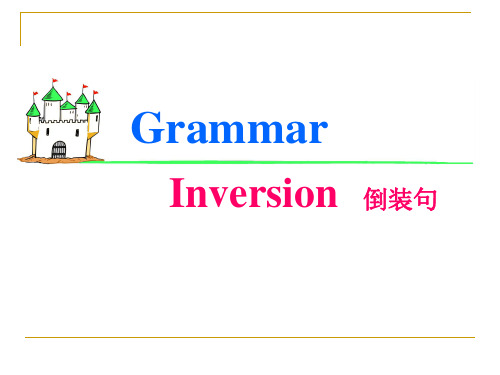
部分倒装
部分倒装 1
用于疑问句 Do you speak English? What do I need to take with me?
部分倒装 2
never, seldom, little, rarely, nowhere, not, hardly,scarcely 等否定词位于句 首时
Never have I seen him before. Seldom do we go out. Little does he know what trouble he is in.
1.我不但去过南京,我还是在那里出生的.
Not only have I been to Nanjing , but also I was born there.
2.我永远忘不了我入团的那一天. ( never ) Never will I forget the day when I joined the Youth League. 3. 只有努力学习, 我们才能学好英语. ( only by….) Only by working hard can we learn Englsion
倒装句
英语的一般语序是主语+谓语,如果把谓语
的全部或是一部分放在主语之前,这种语序
称为倒装。 倒装有两种形式:谓语全部放在
主语之前叫完全倒装;只将助动词、情态动
词、系动词提前叫部分倒装。倒装的原因,
一是语法结构的需要,一是为了强调。
基本语序
主语 + 谓语
He liked her very much.
4.直到她摘下墨镜我才认出她来. ( not ….until ) Not until she took off her sunglasses did I recognize her. 5.直到昨天我才知道真相。 Not until yesterday did I know the truth.
高中英语必修5unit4 Grammar倒装句共51页
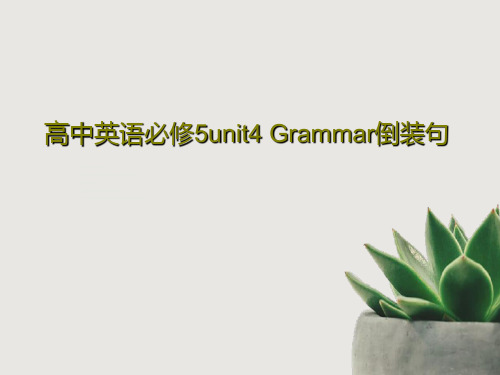
11、获得的成功越大,就越令人高兴 。野心 是使人 勤奋的 原因, 节制使 人枯萎 。 12、不问收获,只问耕耘。如同种树 ,先有 根茎, 再有枝 叶,尔 后花实 ,好好 劳动, 不要想 太多, 那样只 会使人 胆孝懒 惰,因 为不实 践,甚 至不接 触社会 ,难道 你是野 人。(名 言网) 13、不怕,不悔(虽然只有四个字,但 常看常 新。 14、我在心里默默地为每一个人祝福 。我爱 自己, 我用清 洁与节 制来珍 惜我的 身体, 我用智 慧和知 识充实 我的头 脑。 15、这世上的一切都借希望而完成。 农夫不 会播下 一粒玉 米,如 果他不 曾希望 它长成 种籽; 单身汉 不会娶 妻,如 果他不 曾希望 有小孩 ;商人 或手艺 人不会 工作, 如果他 不曾希 望因此 而有收 益。-- 马钉路 德。
21、要知道对好事的称颂过于夸大,也会招来人们的反感轻蔑和嫉妒。——培根 22、业精于勤,荒于嬉;行成于思,毁于随。——韩愈
23、一切节省,归根到底都归结为时间的节省。——马克思 24、意志命运往往背道而驰,决心到最后会全部推倒。——莎士比亚
25、学习是劳动,是充满思想的劳动。——乌申斯基
ห้องสมุดไป่ตู้谢谢!
高中英语必修五unit4+倒装解析
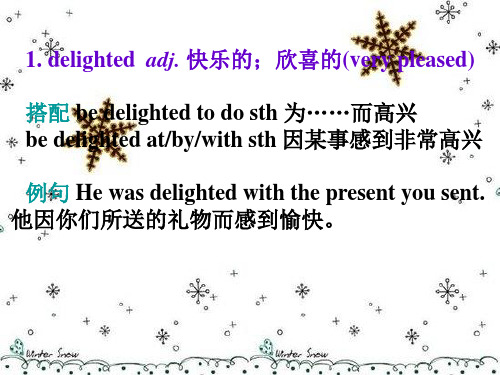
比较 pleased /glad: happy because sth good has happened
delighted /thrilled /overjoyed: very happy because sth good has happened
例句 You must work hard to acquire a good knowledge of English.要精通英语你必须用功。
She managed to acquire two tickets for the concert. 她设法弄到两张音乐会的票。
5. assess vt. 评估;评定;估价
1. delighted adj. 快乐的;欣喜的(very pleased)
搭配 be delighted to do sth 为……而高兴 be delighted at/by/with sth 因某事感到非常高兴
例句 He was delighted with the present you sent. 他因你们所送的礼物而感到愉快。
比较 help一般用语,用于help (to) do, help sb. (to) do等 句型。
give sb. a hand非正式语,多用于请人提或拿东西。 lend a hand 非正式语,多指人手不够的提供帮助。
3. concentrate vt. 集中;聚集
搭配 concentrate on (doing) sth 专心(干)某事 concentrate one’s efforts /attention on把……集中在 …… 例句 I can’t concentrate on my studies with all that noise going on.吵闹声不绝于耳,我无法集中精神学must __c_o_n_c_e_n_t_r_a_t_e___ our efforts __o__n____
高二英语必修5 Unit 4 Making the news倒装讲解及练习

高二英语必修5 Unit 4 Making the news倒装讲解与练习语法专题--- 倒装巧记倒装〔一〕这〔里〕、那〔里〕、上、下、进、出、离。
〔二〕强调表语和状语。
〔三〕否认副、连位第一。
〔四〕so, nor, neither, 也如此。
〔五〕as(though), however引导让步句。
〔六〕only 修状位句首切牢记。
说明:〔一〕在以here, there 或out, in, up, down, away(off)等副词开头的句子里,表示强调,主语是名词时用倒装句。
此结构不需加助动词。
〔1〕Here comes the bus.〔2〕There goes the bell.〔3〕Down came the rain.〔4〕Into the hall came three women.〔5〕Away(off) went the girl without telling anyone.〔6〕Out rushed the man, gun in hand.〔7〕In came the teacher.如果后面的主语是人称代词时,如此主谓不倒装。
〔8〕Away she went with tears in her eyes.(二)为了保持句子的平蘅或为了强调表语和状语,或使上下文严密衔接,把它们放在句首用倒装句。
该结构不需加助动词。
〔1〕East of the town lies a beautiful lake.〔2〕In a lecture hall of a university in England sits a professor.〔3〕Outside the doctor’s clinic were twenty patients.(三)含有否认或半否认意义的副词、连词如:hardly(scarcely), never, not, not only, little, seldom, no sooner…(than), not until, no where等,放在句首时要用倒装句。
高中英语人教新课标必修五-Unit 4 Making the news-学案设计(有答案)

Unit 4 Making the news【学习目标】掌握本单元的常用词汇表达。
【学习重难点】熟练记住常用词汇与词组。
【学习方法】速读、细读、归纳、练习【学习内容】一、重点词汇1. accuse vt.指责;谴责;控告accuse sb. of sth. 因……指责/控告……be accused of (doing) sth. 因……受指责/控告……①He was accused of theft.他被指控犯偷盗罪。
②I don't think anyone can accuse him of not being frank.我看谁也不能说他不坦率。
●易混辨析accuse与charge两个词都有“控诉,指控”之意,但它们后面所搭配的介词不同。
accuse vt.指控;控诉,与介词of连用。
charge vt.可以指因为小错而受到责备,也可指因违法而受到控告,与介词with连用。
①Are you accusing me of lying?你是在指责我撒谎吗?②The police charged him with murder.警察指控他犯了谋杀罪。
即境活用单项填空Cooperman and Taylor are ________ of selling $4700 worth of heroin to a number of drug users.A.accused B.attachedC.accustomed D.charged答案:A2.case n.情况;病例;案例in any case无论如何,总之just in case以防(万一)in case of万一……,如果发生……in no case决不(置于句首,引起倒装)in that case 如果那样的话;在那种情况下in the case of就……来说;关于as is often the case这是常有的事①In some cases, it is necessary to operate.有些情况下,动手术是必要的。
必修五Unit4倒装句

必修五Unit4倒装句概述英语句子的基本语序是主语在前、谓语动词在后(the natural order),当语序颠倒时就成了倒装结构(the inverted order)。
把谓语的全部放在主语之前称为完全倒装;而只把助动词或情态动词放在主语之前,则称为部分倒装。
基本语序(natural order)subject (主)+ predicate (谓)+object (宾)I love English倒装的分类1.部分倒装:主语与助动词/情态动词/系动词倒装结构:助动词/情态动词+主语+谓语动词Never have I heard such a thing. = I have never heard such a thing.2.全部倒装: 主语与谓语动词倒装结构:谓语动词+主语Down fell the rain. = The rain fell down.全部倒装句1. here, there, now, then, thus,out,away, up, down等副词置于句首, 谓语动词常be, come, go, lie, run等。
当其主语为名词时,通常要使用倒装。
例如:a. There goes the bell.b. Then came the chairman.c. Here is your letter.d. Away went the boy to the school.e. Off goes the woman.注意:上述全部倒装句型结构中的主语必须是名词,如果主语是人称代词则不能倒装。
Here he comes. Away they went.2.以引导词there开头的句子,须使用倒装结构,除there be 外还有there live / stand / lie / exist等。
例如:a. There are three books on the desk.b. There lived an old fisherman near the sea.c. There stands a tall building in the centre of the town.3. so, neither, nor表示前面所述一件事也适合另一个人或物时。
新人教版高二英语必修五第四单元语法---倒装导学案
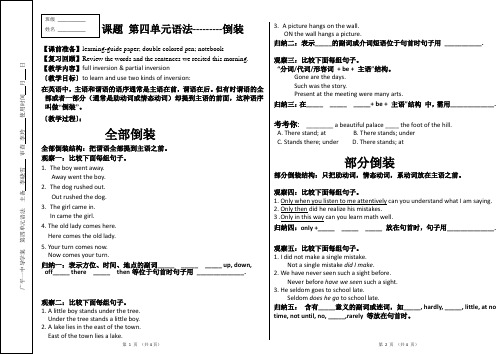
课题第四单元语法---------倒装【课前准备】learning-guide paper; double colored pen; notebook【复习回顾】Review the words and the sentences we recited this morning. 【教学内容】full inversion & partial inversion〔教学目标〕to learn and use two kinds of inversion:在英语中,主语和谓语的语序通常是主语在前,谓语在后。
但有时谓语的全部或者一部分(通常是助动词或情态动词)却提到主语的前面,这种语序叫做“倒装”。
〔教学过程〕:全部倒装全部倒装结构:把谓语全部提到主语之前。
观察一:比较下面每组句子。
1.The boy went away.Away went the boy.2.The dog rushed out.Out rushed the dog.3.The girl came in.In came the girl.4. The old lady comes here.Here comes the old lady.5. Your turn comes now.Now comes your turn.归纳一:表示方位、时间、地点的副词_____ _____ _____ up, down, off_____ there _____ then等位于句首时句子用______________.观察二:比较下面每组句子。
1. A little boy stands under the tree.Under the tree stands a little boy.2. A lake lies in the east of the town.East of the town lies a lake. 3.A picture hangs on the wall.ON the wall hangs a picture.归纳二:表示_____的副词或介词短语位于句首时句子用___________.观察三:比较下面每组句子。
高中人教版英语必修5学案:Unit 4 Section Ⅲ Grammar——倒装 含答案
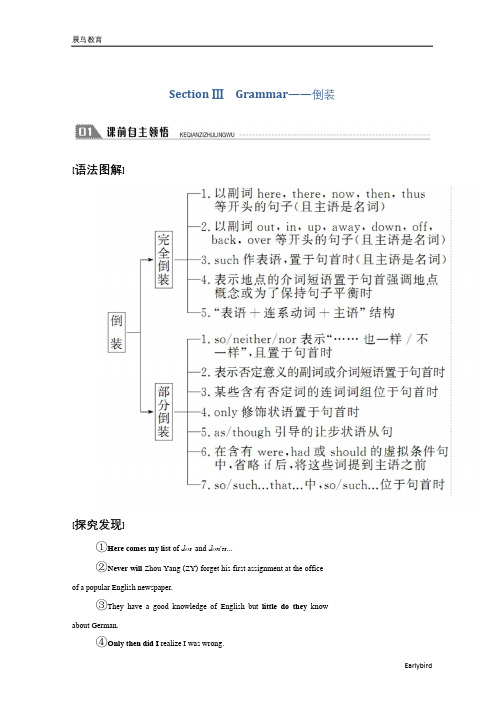
Section ⅢGrammar——倒装[语法图解][探究发现]①Here comes my list of dos and don'ts...②Never will Zhou Yang (ZY) forget his first assignment at the office of a popular English newspaper.③They have a good knowledge of English but little do they know about German.④Only then did I realize I was wrong.⑤Only by shouting was he able to make himself heard.⑥Only when you have seen what he or she does can you cover astory by yourself.⑦Only if you ask many different questions will you acquire all theinformation you need to know.⑧So fast did he run that I couldn't follow him.[我的发现](1)倒装句有两种情况:一种为完全倒装;一种为部分倒装。
例句①为完全倒装;其余为部分倒装。
(2)否定副词(如never, neither, nor, little, hardly 等)位于句首时,句子常用部分倒装。
例句②③就属于这类情况。
(3)only 后接状语(可为单个副词、介词短语,也可以为从句)位于句首时,句子常用部分倒装。
如例句④⑤⑥⑦。
(4)例句⑧为so...that...结构。
若“so+形容词/副词”位于句首时,主句要用部分倒装。
一、倒装的定义在英语中,主语和谓语的语序通常是主语在前,谓语在后。
人教版高二英语必修五第四单元语法-倒装句教案

3.Students will be able to use inversions in their own spoken English to make their ideas much clearer.
S+V+O(主+谓+宾)
3.I am a students.
S+V+P(主+系+表)
4.I give him some money.
S+V+IO +O(主+谓+间宾+直宾)
5.I heard her singing last night.
S+V+O +C(主+谓+宾+宾补)
Step 2 : Presentationand practice
A teacher stands in the front of the classroom.
In the front of the classroom_______________
(5)方in, out, up, down, away,off
The balloons flew up.
Up_____________
共案
个案
Book 5 Unit4Making the news
Period3Grammar(inversion)
Ⅰ.Teaching Goals(教学目标)
1.Students can recognize the inversion patterns, and get to know of its grammar meaning of emphasizing.
高中英语必修五unit4语法倒装句知识讲解和练习
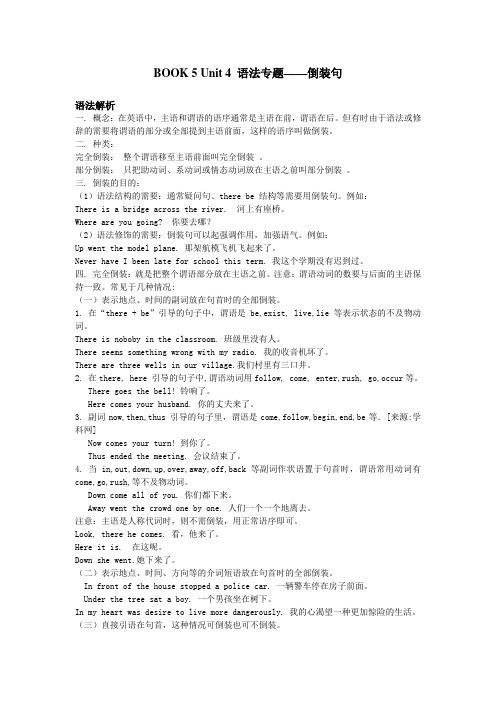
BOOK 5 Unit 4 语法专题——倒装句语法解析一. 概念:在英语中,主语和谓语的语序通常是主语在前,谓语在后。
但有时由于语法或修辞的需要将谓语的部分或全部提到主语前面,这样的语序叫做倒装。
二. 种类:完全倒装:整个谓语移至主语前面叫完全倒装。
部分倒装:只把助动词、系动词或情态动词放在主语之前叫部分倒装。
三. 倒装的目的:(1)语法结构的需要:通常疑问句、there be 结构等需要用倒装句。
例如:There is a bridge across the river. 河上有座桥。
Where are you going? 你要去哪?(2)语法修饰的需要:倒装句可以起强调作用,加强语气。
例如:Up went the model plane. 那架航模飞机飞起来了。
Never have I been late for school this term. 我这个学期没有迟到过。
四. 完全倒装:就是把整个谓语部分放在主语之前。
注意:谓语动词的数要与后面的主语保持一致。
常见于几种情况:(一)表示地点、时间的副词放在句首时的全部倒装。
1. 在“there + be”引导的句子中,谓语是be,exist, live,lie 等表示状态的不及物动词。
There is noboby in the classroom. 班级里没有人。
There seems something wrong with my radio. 我的收音机坏了。
There are three wells in our village.我们村里有三口井。
2. 在there, here 引导的句子中,谓语动词用follow, come, enter,rush, go,occur等。
There goes the bell! 铃响了。
Here comes your husband. 你的丈夫来了。
3. 副词now,then,thus 引导的句子里,谓语是come,follow,begin,end,be等.[来源:学科网]Now comes your turn! 到你了。
必修五unit4Grammar-倒装
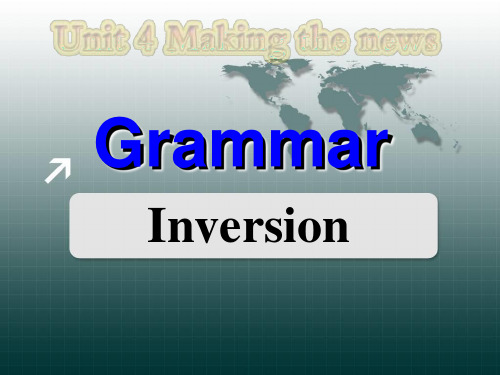
4. 在so / such … that结构中, so或such引导的 部分放在句首时。
Such a noble person is he that people all respect him.
3. Your dog runs here. Here runs your dog.
4. A picture hangs on the wall. On the wall hangs a picture.
1. In the rain stood a little girl. 2. Away went the boy. 3. Here runs your dog. 4. On the wall hangs a picture.
Ex. ________ a beautiful palace ____ the foot of the hill.
A. There stand; at B. There stands; under C. Stands there; under D. There stands; at
2. 在以here, there, now, then等副词开头的句 子里, 谓语动词常为be, come, go等。 e.g. Here comes the old lady! Then followed another shot of gun.
acquire(al通l t常he是in助for动m词at或ion情y态ou动n词eed)to know. you will却ac提qu到ir主e 语的前面,这种语序 3. Not only am I in叫te做re“s倒ted装in”。photography, but I took a course at university to update my skills.
人教版高中英语必修五Book5Unit4Grammar(倒装)
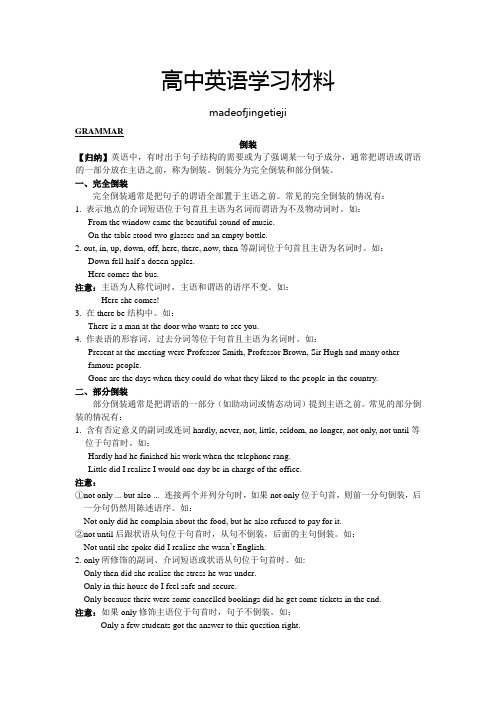
高中英语学习材料madeofjingetiejiGRAMMAR倒装【归纳】英语中,有时出于句子结构的需要或为了强调某一句子成分,通常把谓语或谓语的一部分放在主语之前,称为倒装。
倒装分为完全倒装和部分倒装。
一、完全倒装完全倒装通常是把句子的谓语全部置于主语之前。
常见的完全倒装的情况有:1. 表示地点的介词短语位于句首且主语为名词而谓语为不及物动词时。
如:From the window came the beautiful sound of music.On the table stood two glasses and an empty bottle.2. out, in, up, down, off, here, there, now, then等副词位于句首且主语为名词时。
如:Down fell half a dozen apples.Here comes the bus.注意:主语为人称代词时,主语和谓语的语序不变。
如:Here she comes!3. 在there be结构中。
如:There is a man at the door who wants to see you.4. 作表语的形容词、过去分词等位于句首且主语为名词时。
如:Present at the meeting were Professor Smith, Professor Brown, Sir Hugh and many other famous people.Gone are the days when they could do what they liked to the people in the country.二、部分倒装部分倒装通常是把谓语的一部分(如助动词或情态动词)提到主语之前。
常见的部分倒装的情况有:1. 含有否定意义的副词或连词hardly, never, not, little, seldom, no longer, not only, not until等位于句首时。
高二英语必修五Unit4倒装学生版
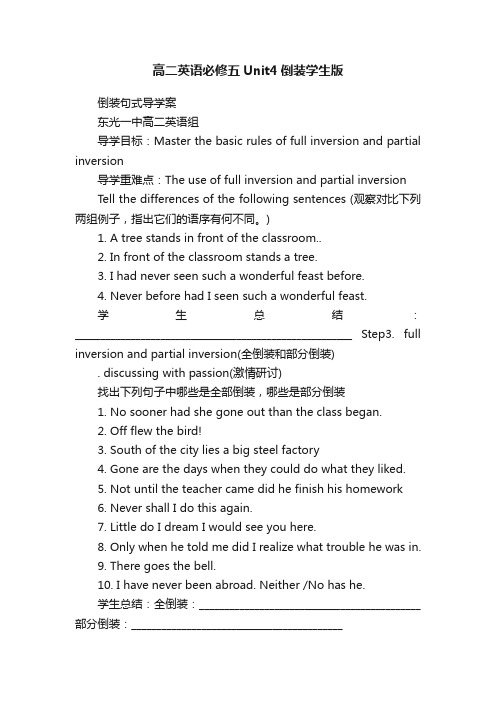
高二英语必修五Unit4倒装学生版倒装句式导学案东光一中高二英语组导学目标:Master the basic rules of full inversion and partial inversion导学重难点:The use of full inversion and partial inversionTell the differences of the following sentences (观察对比下列两组例子,指出它们的语序有何不同。
)1. A tree stands in front of the classroom..2. In front of the classroom stands a tree.3. I had never seen such a wonderful feast before.4. Never before had I seen such a wonderful feast.学生总结:_______________________________________________________ Step3. full inversion and partial inversion(全倒装和部分倒装). discussing with passion(激情研讨)找出下列句子中哪些是全部倒装,哪些是部分倒装1. No sooner had she gone out than the class began.2. Off flew the bird!3. South of the city lies a big steel factory4. Gone are the days when they could do what they liked.5. Not until the teacher came did he finish his homework6. Never shall I do this again.7. Little do I dream I would see you here.8. Only when he told me did I realize what trouble he was in.9. There goes the bell.10. I have never been abroad. Neither /No has he.学生总结:全倒装:____________________________________________ 部分倒装:__________________________________________Step4.完全倒装的类型1. Then goes the boy! (男孩走了)2. Here is your letter.3. There goes the bell.4. Now is the time学生总结:__________________________________________________________________________________________________1. From the valley travelled a frightening sound.(山谷里传来了令人害怕的声音)2. Under the tree stands a little boy. (一个小男孩站在树下)3. Inside the parcel was a letter.4. In front of the lecture hall sits a professor.学生总结:__________________________________________________________________________________________________1. In the front of the room was a table, and behind it stood a beautiful lady.2. Among the speakers was China’s Premier Zhu Rongji, who stressed the need for equality and fairness.3.Present at the meeting were Professor White and many other guests.4. Growing all over the mountain are wild flowers.学生总结:______________________________________________1. Out rushed a boy and a dog.2. Away flew the plane.3. In came the headteacher, with a book in his hand.4. Up went the arrow into the air.学生总结:__________________________________________________________________________________________________1. Such were his words.2. Such was what he said.3. Such was Albert Einstein, a simple man but of great achievement.学生总结:__________________________________________________________________________________________________Step5.部分倒装1. Hardly (Scarcely) had he reached the station when the train started.2. Not once did we visit the city of our own.3. Seldom in all my life have I met such a determined person.4. Not only was there no electricity, but also no water.5. Not until he shouted at the top of his voice did she turn her head.6. Not only do I know her, but I am also her friend.7. Neither have I seen him recently, and nor have I heard from him.8. I don’t know his name, and neither/ nor do I want to.学生总结:______________________________________________1. Hardly (Scarcely) had he reached the station when the train started.2. Not only do I know her, but I am also her friend.3. No sooner had I reached home than the phone began to ring.4. So fast did he walk that I could n’t catch up with him.5. Not until she saw the present did she feel happy.学生总结:_________________________________________________ _________________________________________________1. She is busy doing her homework. So is her brother.2. You passed the exam. So did I.3. He doesn’t like shopping. Neither do I.4. He can’t speak any foreign language. Nor can his father.5. I have never been abroad. Neither /Nor has he.6. He went to college last year. So did I.学生总结:______________________________________________1. Only after three operations was she able to walk without sticks.2. Only then did we realize that the man was blind.3. Only by seizing every minute can we finish it on time.4. Only a few young men went to the theatre.学生总结:______________________________________1. Young as he is, he knows much.2. Search as they would, they could find nobody in the house.学生总结:_________________________________________________ _________________________________________________ 1. Were I in his position, I wouldn’t do it that way.2. Hadn’t you helped me, I would have failed.3. Should it snow, what should we do?学生总结:__________________________________________________________________________________________________Step6:巩固练习:一、选择翻译正确的句子1.直到天黑了那些孩子们才意识到太晚回不了家了。
【精品】人教版高中英语必修五 unit4_倒装句 语法训练 word版含答案
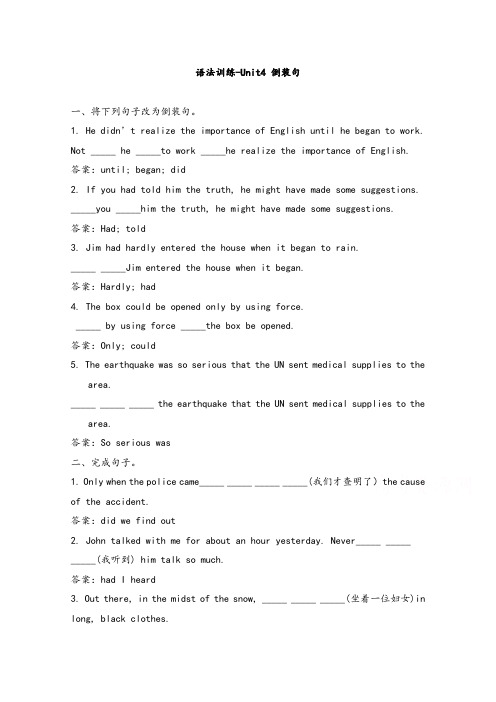
语法训练-Unit4 倒装句一、将下列句子改为倒装句。
1. He didn’t realize the importance of English until he began to work. Not _____ he _____to work _____he realize the importance of English.答案:until; began; did2. If you had told him the truth, he might have made some suggestions._____you _____him the truth, he might have made some suggestions.答案:Had; told3. Jim had hardly entered the house when it began to rain._____ _____Jim entered the house when it began.答案:Hardly; had4. The box could be opened only by using force._____ by using force _____the box be opened.答案:Only; could5. The earthquake was so serious that the UN sent medical supplies to thearea._____ _____ _____ the earthquake that the UN sent medical supplies to the area.答案:So serious was二、完成句子。
1. Only when the police came_____ _____ _____ _____(我们才查明了)the cause of the accident.答案:did we find out2. John talked with me for about an hour yesterday. Never_____ __________(我听到) him talk so much.答案:had I heard3. Out there, in the midst of the snow, _____ _____ _____(坐着一位妇女)in long, black clothes.答案:sat a woman4.Lily can’t ride a bike, and _____ _____ _____ (露西也不会).答案:nor/neither did Lucy5. Be quiet! _____ _____ _____ _____ (老师来了).答案:here comes the teacher6. _____ _____ _____ _____(要不是)for the free tickets, I would not have gone to the cinema so often.答案:Had it not been7. Not until he retired from teaching three years ago _____ _____ _____(他才考虑)having a holiday abroad.答案:did he consider8. _____ _____ _____ _____ _____ _____ (一次也没有发生)Michael that he could one day become a top student in his class.答案:not once did it occur to9. Only when he reached the teahouse _____ _____ _____ (他才意识到)it was the same place he’d been in last year.答案:did he realize。
高中英语必修5-Unit4-整套学案(词汇+倒装句+答案)
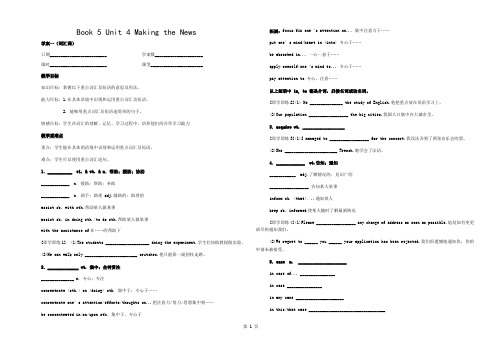
Book 5 Unit 4 Making the News学案一(词汇课)日期__________________________ 学案数______________________课时__________________________ 课型________________________教学目标知识目标:掌握以下重点词汇及短语的意思及用法。
能力目标:1.在具体语境中识别和运用重点词汇及短语。
2. 能够用重点词汇及短语造简单的句子。
情感目标:学生在词汇的理解、记忆、学习过程中,培养他们的合作学习能力教学重难点重点:学生能在具体的语境中识别和运用重点词汇及短语。
难点:学生可以使用重点词汇造句。
1.___________ vi. & vt. & n.帮助;援助;协助_____________ n.援助;帮助;补助_____________ n.助手;助理 adj.辅助的;助理的assist sb. with sth.帮助某人做某事assist sb. in doing sth./to do sth.帮助某人做某事with the assistance of在……的帮助下[即学即练1] (1)The students ____________________ doing the experiment.学生们协助教授做实验。
(2)He can walk only ________________________ crutches.他只能靠一副拐杖走路。
2.______________ vt. 集中;全神贯注_______________ n. 专心;专注concentrate (sth.) on (doing) sth. 集中于;专心于……concentrate one’s attention/efforts/thoughts on...把注意力/努力/思想集中到……be concentrated in/on/upon sth. 集中于,专心于拓展:focus/fix one‘s attention on... 集中注意力于……put one’s mind/heart in (into) 专心于……be absorbed in... 一心一意于……apply oneself/one‘s mind to... 专心于……pay attention to 专心,注意……以上短语中 in, to 都是介词,后接名词或动名词。
高中英语 必修5 Unit 4 Period Two Learning about Language 精品导学案(含答案)
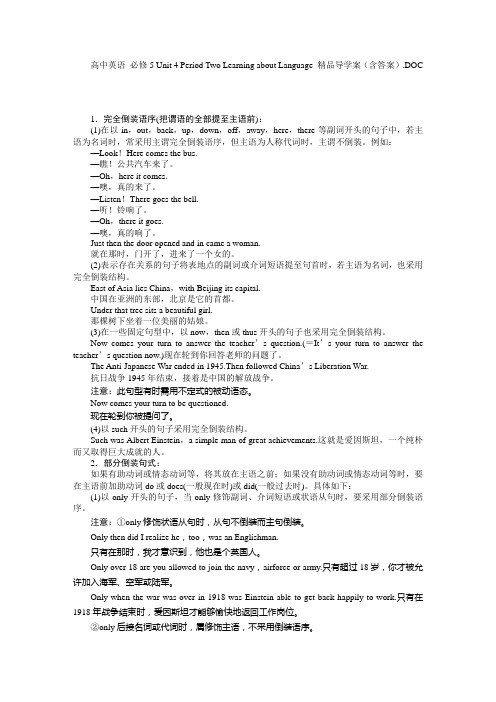
高中英语必修5 Unit 4 Period Two Learning about Language 精品导学案(含答案).DOC 1.完全倒装语序(把谓语的全部提至主语前):(1)在以in,out,back,up,down,off,away,here,there等副词开头的句子中,若主语为名词时,常采用主谓完全倒装语序,但主语为人称代词时,主谓不倒装。
例如:—Look!Here comes the bus.—瞧!公共汽车来了。
—Oh,here it comes.—噢,真的来了。
—Listen!There goes the bell.—听!铃响了。
—Oh,there it goes.—噢,真的响了。
Just then the door opened and in came a woman.就在那时,门开了,进来了一个女的。
(2)表示存在关系的句子将表地点的副词或介词短语提至句首时,若主语为名词,也采用完全倒装结构。
East of Asia lies China,with Beijing its capital.中国在亚洲的东部,北京是它的首都。
Under that tree sits a beautiful girl.那棵树下坐着一位美丽的姑娘。
(3)在一些固定句型中,以now,then或thus开头的句子也采用完全倒装结构。
Now comes your turn to answer the teacher’s question.(=It’s your turn to answer the teacher’s question now.)现在轮到你回答老师的问题了。
The Anti-Japanese War ended in 1945.Then followed China’s Liberation War.抗日战争1945年结束,接着是中国的解放战争。
注意:此句型有时需用不定式的被动语态。
Now comes your turn to be questioned.现在轮到你被提问了。
- 1、下载文档前请自行甄别文档内容的完整性,平台不提供额外的编辑、内容补充、找答案等附加服务。
- 2、"仅部分预览"的文档,不可在线预览部分如存在完整性等问题,可反馈申请退款(可完整预览的文档不适用该条件!)。
- 3、如文档侵犯您的权益,请联系客服反馈,我们会尽快为您处理(人工客服工作时间:9:00-18:30)。
Book 5 Unit 4 Making the News学案一(词汇课)日期__________________________ 学案数______________________课时__________________________ 课型________________________教学目标知识目标:掌握以下重点词汇及短语的意思及用法。
能力目标:1.在具体语境中识别和运用重点词汇及短语。
2. 能够用重点词汇及短语造简单的句子。
情感目标:学生在词汇的理解、记忆、学习过程中,培养他们的合作学习能力教学重难点重点:学生能在具体的语境中识别和运用重点词汇及短语。
难点:学生可以使用重点词汇造句。
1.___________ vi. & vt. & n.帮助;援助;协助_____________ n.援助;帮助;补助_____________ n.助手;助理adj.辅助的;助理的assist sb. with sth.帮助某人做某事assist sb. in doing sth./to do sth.帮助某人做某事with the assistance of在……的帮助下[即学即练1](1)The students ____________________ doing the experiment.学生们协助教授做实验。
(2)He can walk only ________________________ crutches.他只能靠一副拐杖走路。
2.______________ vt. 集中;全神贯注_______________ n. 专心;专注concentrate (sth.) on (doing) sth. 集中于;专心于……concentrate one’s attention/efforts/thoughts on...把注意力/努力/思想集中到……be concentrated in/on/upon sth. 集中于,专心于拓展:focus/fix one‘s attention on... 集中注意力于……put one’s mind/heart in (into) 专心于……be absorbed in... 一心一意于……apply oneself/one‘s mind to... 专心于……pay attention to 专心,注意……以上短语中in, to 都是介词,后接名词或动名词。
[即学即练2](1) He _______________ the study of English.他把重点放在英语学习上。
(2)Our population __________________ the big cities.我国人口集中在大城市里。
3.acquire vt. ___________________[即学即练3](1)I managed to __________________ for the concert.我设法弄到了两张音乐会的票。
(2)She ________________________ French.她学会了法语。
4._____________ vt.告知;通知____________ adj.了解情况的;见识广的__________________ 告知某人某事inform sb. (that)...通知某人keep sb. informed使某人随时了解最新情况[即学即练4](1)Please __________________ any change of address as soon as possible.地址如有变更请尽快通知我们。
(2)We regret to ______ you ______ your application has been rejected.我们很遗憾地通知你,你的申请未被接受。
5.case n. ______________________in case of... ________________in case ________________in any case ______________________in this/that case ___________________________________in no case _____________________in the case of _______________________as is often the case 这是常有的事as the case may/might be 看情况,视情况而定[即学即练5](1)__________________ people have had to wait several weeks for an appointement.在某些情况下,人们必须等上好几周才能得到约见。
(2)____________ will be heard next week. 此案下周审理。
(3) You‘d better take the keys ____________ I’m out.你最好带上钥匙,以防我不在家。
6.accuse vt.____________________________________=charge sb. with sth.因某事而控告/谴责某人accuse sb. as...指控某人为……accuse sb. for sth. 为某事指责某人[即学即练6](1)My teacher is always _______ me ______ carelessness.我的老师总是指责我粗枝大叶。
(2)Mary __________________ an accomplice.玛丽被指控为同谋犯。
(3)Man often _________ nature ______ his own misfortunes.人类常把自身的不幸归罪于天。
拓展:与accuse sb. of sth.结构相似的有:_______________________ 抢劫某人的某物_______________________ 警告某人某事_______________________ 使某人摆脱某事_______________________ 提醒某人某物________________________通知某人某事________________________赞成某人某事7.______________ n.要求,需要vt.强烈要求demand sth.要求某物demand sth. of/from sb.向某人要求某物demand to do要求干……demand that...要求……(从句用虚拟语气,即“should+动词原形”,should可省略)be in(great) demand(迫切)需求satisfy one’s demands满足某人的需求[即学即练7](1) It’s impossible to satisfy everyone’s __________.满足每个人的需求是不可能的。
(2)After school Tom ___________ help _________ me.放学后,汤姆要求我帮助。
(3)She demanded that I (______) ____ everything to her about it.她要求我把知道的整个事情都告诉她。
8.approve v. _______________________________ n. [U]批准;赞成;认可approve sth. 核准(批准)某事approve of sb./sth. _______________________approve of sb.’s doing sth. 同意某人做某事without approval __________________with one’s approval 经某人同意[即学即练8](1)The minister ___________ the building plan.部长批准了这项建筑计划。
(2)The resolution ________________68 to 10 with 28 abstentions.决议以68票对10票通过,28票弃权。
(3)Mother doesn‘t ____________ her smoking.母亲不赞成她吸烟。
9.___________________ 依靠;依赖;信赖;依……而定depend on/upon sth. 依靠某物;由……决定depend on sb. to do sth. 指望/依靠某人做某事depend on/upon sb./sth. for sth.指望/依靠某人/某物提供某物depend on it that...相信某件事(it是虚词,真正的内容是that从句)depend on+wh-clause 依赖于That depends./It all depends.这很难说;得看情况。
[即学即练9](1) Success ____________ your effort and ability.成功与否得看你的努力和能力。
(2)-Is he coming?他来吗?-____________. He may not have time.那要看情况。
他不一定有时间。
10._______________________ 以便,为了(做)……(引导目的状语,不放于句首)in order to 以便,为了……(引导目的状语,可放句首)so...as to 如此……以致(引导结果状语)in order that 为了,以便……(引导目的状语从句)so that 为了……;结果……(引导目的或结果状语从句)so...that... 如此……以至于(引导结果状语从句)提示:当用so as to, in order to时,句子前后动作的主语须一致。
否则,用so that, in order that. [即学即练10](1)He ran quickly ____________/______________ catch the last bus.他跑得很快以便赶上末班车。
(2)We turned on the light __________/_________________we might see what it was.=We turned on the light _____________ see what it was.我们把灯打开,以便看看它是什么。
